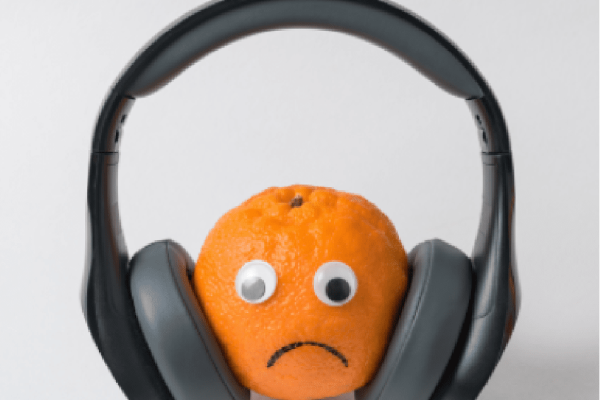When Noise Takes You Off Your Game

In the world of ergonomics, noise issues and solutions have typically been relegated to noisy environments such as construction sites, factories, assembly lines, and other inherently noisy environments. But with so many of us WFH, soon to be returning to some variation of hoteling (unassigned seating) at the office, and for many of us, working in both environments, there are new challenges when it comes to noise to content with.
“MY EARS ARE RINGING.”
“I CAN’T TAKE ONE MORE MINUTE IN MY EARBUDS.”
“WHAT!?!”
“IS EAR FATIGUE A THING? BECAUSE I THINK I HAVE IT.”
“I CAN’T FOCUS WHEN I HEAR OTHER PEOPLE IN MY HOUSE TALKING.”
“THIS NOISE IS GIVING ME A HEADACHE.”
Let’s break things down a bit.
IF YOU ARE EXPERIENCING EAR FATIGUE (OR RINGING IN YOUR EARS) . . .
. . . then know that your ears are crying out for help. This is something you do not want to ignore.
Here are some things to consider:
- Take Breaks From Your Earbuds or Headphones: You may elect or need to use earbuds when you work for better hearing, filtering out background noise, and even for greater privacy. But it is important to limit the amount of time in your earbuds or headphones. The World Health Organization (WHO) suggests no more than 1 hour per day, while the Occupational Safety and Health Administration (OSHA) says that as long as your volume is less than 85 decibels, you should be safe wearing them throughout your day. Our recommendation is to limit the use of them to no more than 4 hours per day, keep your volume between 50 – 65 decibels and take an earbud break at least once an hour.
- Headphones vs. Earbuds: If you have the choice, you may want to opt for over-the-ear headphones vs. earbuds. Since earbuds are closer to your eardrum, you run the risk of greater noise exposure than with over-the-ear headphones. You may also want to use a speaker microphone for your video calls instead of headphones or earbuds.
- Seek Help if Needed: Hearing loss is more prevalent than ever. So, if something is bothering you like sensitivity in your ears, ringing or a loss of hearing, go see your health professional ASAP for help and guidance.
IF NOISE TRIGGERS HEADACHES . . .
. . . you are far from alone. Noise can trigger stress headaches and bring about migraines, which, if you are a sufferer, you know is no small matter.
Here are some things that can help:
- Sound-proofing Your Work Area: This can be done with noise-absorbing materials like rugs on the floor, the walls, heavy curtains and even sound-proof panels. You can also try using a white noise machine to muffle loud background noise and provide soothing white noise or ambient sounds at a frequency that won’t harm your ears.
- Consider Noise-Cancelling Headphones or Earplugs: Both of these methods work well to block out unwanted noise which can help prevent the onset of noise-induced headaches.
- Desensitization Therapy: If your headaches persist, or you don’t have control over the noises that are triggering you, talk to your health professional about desensitization therapy which over time can increase your tolerance threshold to triggering noises.
IF YOU CAN’T CONCENTRATE DUE TO NOISE . . .
. . . you may benefit from the following suggestions. Noise distraction is on the rise as we continue to WFH and head back to our offices, many of which are embracing an open-seating, hotelling model, which means that many of us will no longer have a designated desk or office.
Hopefully, these tips will help:
- Noise-canceling Headphones or Earplugs: This can do wonders to tune out distracting noise coming from household members, office mates, and background noise.
- Listening to Soft Music: Taking noise-canceling headphones a step further and listen to some soothing music that will not only block out distracting noises but also can help you sharpen your focus.
- Take Listening Breaks: This includes spacing out your video meetings to literally give your ears a break, scheduling in break times where you can go for a walk, sit somewhere quiet, and any other place you can go to quiet your ears and your mind.
We hope this helps and if you have strategies that work for you, please leave them in the comments. We’d love to hear from you. (No pun intended!)
Posted 3 years ago
Add a comment